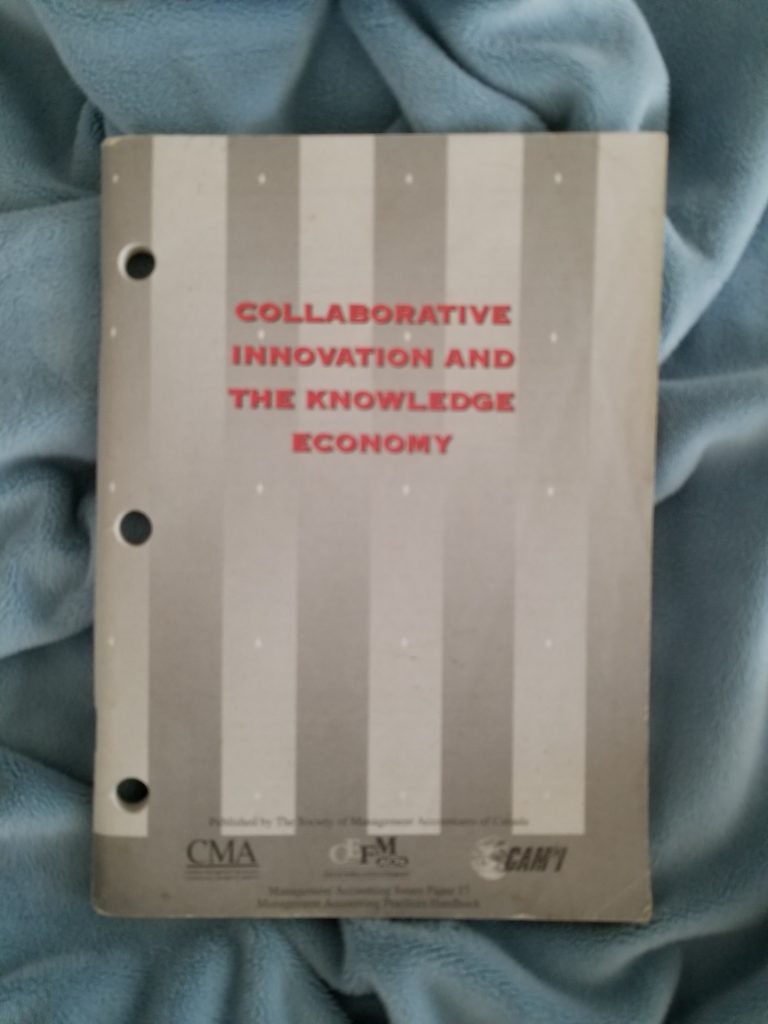
Collaborative Innovation and the Knowledge Economy - The Society of Management Accountants of Canada.
Available in French and English
This is one of a trilogy of publications that also cover the State-of-the-Art and State-of-the-Practice. There is also a One Day Practicum: An Interactive Workshop based on this handbook.
To order: orderdesk@cma-canada.org
Foreward
Issues Papers provide Certified Management Accountants (CMAs), management accounting practitioners, and other interested parties with information on current and emerging issues affecting the responsibility and role of management and management accounting.
Interest in a new economic world order based upon intellectual capital has grown exponentially in both industrialized nations and developing countries around the world. Organisations are wrestling with the implications of such dynamic change in every aspect of our society. Enterprise leaders are laden with outdated management technologies, not suitable for such an unpredictable climate of opportunity. Indeed, the ability to effectively manage these bountiful, intangible resources may be the challenge of the 21st Century.
There is a difference between an organisation's ability to learn and its ability to apply learning efficiently and effectively. A good idea is a long way from a profitable product or service. Understanding the innovation process - and the concurrent role of individual and organisational learning - is fundamental to advising the strategic direction of a company. This paper recognizes the increasing importance of knowledge as both a driver of innovation and a 'product' - in its own right - to be sold or shared for competitive advantage.
Assuming that great ideas can come from anywhere - both internal and external to the corporation - the role of the CMA takes on new dimensions (e.g., managing the relationships which add value throughout the complex innovation process). It is the quality of interaction, degree of dialogue and substance of conversations which ultimately effect bottom-line results. Collaboration is destined to be a primary proficiency for the next millennium.
A new value-proposition is emerging - one which relies upon the intangible, intellectual competence of a firm. Only through an integration of economic, behavioral and technological factors can the 'productivity paradox' be resolved. Business performance is increasingly based upon invisible assets, networked Organisations, cross-boundary processes, and knowledge processing technology. This proposition lacks the linearity of thought and short-term focus that limits traditional and publicly traded corporations. It places business priorities in the context of what 'could be' as opposed to what normally 'is'. It's nature is systemic, systematic and symbiotic.
The only competitive advantage of the dynamic future is an organisation's ability to learn - create ideas and move them into the marketplace profitably and expeditiously. In fact, it is the one capacity which is difficult - even impossible - to imitate or emulate - because it is directly related to human capabilities. The company's ability to manage knowledge must be at the heart of a strategy to create distinctive competencies, unique market positioning and sustained growth over time.
The entrepreneur is considered one who not only has the capacity to invent, create and/or acquire new ideas, but can also command resources to put them to demonstrated good use. This type of behavior needs to be encouraged throughout the organisation. Managers need to be in constant surveillance of good ideas and practices which might increase time-to-market and/or market differentiation. This demands a new culture of sharing, interdependence and interaction which is not reflected in traditional, hierarchical management. The CMA needs a new perspective on the process of innovation, progressive methods for monitoring progress and new tools for strategy implementation.
It is not that organisations are at a loss for new ideas, but rather the infrastructure to effectively move ideas to prosperity (i.e., the innovation cycle). This Issues Paper is designed to:
- outline the major trends - established, emerging and over the horizon;
- identify fragmented streams of activity which could be coalesced with a new common innovation language;
- define the core premise fundamental to a collaborative future of shared prosperity; and
- suggest a blueprint for a dialogue which may chart a direction toward the emerging 'world trade of ideas'.
The knowledge economy provides a climate of opportunism. This paper expands the current thinking of the CMA and structures the dialogue for the profession. This is a very complex, timely topic. Our intent was to provide a simple frame for considering the issues and related managerial implications. There is a need for new approaches and new techniques - many of which are emerging. To guide executives forward, CMA's must develop new ways to leverage the intellectual and innovation capacity of their organisations. To do so requires a fundamental understanding of this new business context, ways to standardize best practices, new measures of success and cultures of experimentation and responsible risk.
Most important, the transformations underway are occurring at every economic level simultaneously. This is why the impact is so profound and - if effectively managed - can lead to a world of shared prosperity. Leadership in financial strategies must go beyond the notions of benchmarking, activity-base accounting, and total quality management. We can no longer be constrained by old measures and metrics. New words are needed; but accompanying management models are still 'works-in progress'.
This publication is descriptive rather than prescriptive. Although it is comprehensive in scope concerning concepts, language and world-wide thinking on the topic, it does not address specific implementation questions, such as:
- How does an organisation organize to create a knowledge strategy?
- How do organisations with limited resources participate?
- How do talent limitations impact ability to impact strategies?
- What incentives will increase the capacity for knowledge-sharing?
- How to raise current staffing ability to higher knowledge levels?
- How do organisations continue during periods of turmoil?
- What knowledge products or markets are emerging?
Once the issues have been outlined and debated, a Management Accounting Guideline (MAG) will follow with specific steps on how best to capitalize upon the opportunities in your organisation. For now, it is important to grasp that these changes are fundamental in the ways individuals work, industries evolve and societies prosper.
This publication comes with a warning label. It is designed as a mind-stretcher. Basic beliefs and fundamental principles will be challenged. As a state-of-the-future, it paints a somewhat ideal picture of an economic environment and business practices based upon building collaborative advantage, not competition. It may be considered somewhat techno-utopian and neo-Luddites may have a counter view of how technology may change the nature of the global economy in the future. The focus shifts from problem-solving to opportunity-identification. To deal with the inevitable complexity, it calls for a dual appreciation of natural evolution and rational thinking to optimize results. The foundation for management is one of knowledge innovation, not change management. For those who take a less deterministic view of the world, this focus on creativity and boundless resources will be refreshing.
To order Collaborative Innovation and the Knowledge Economy write to orderdesk@cma-canada.org.
